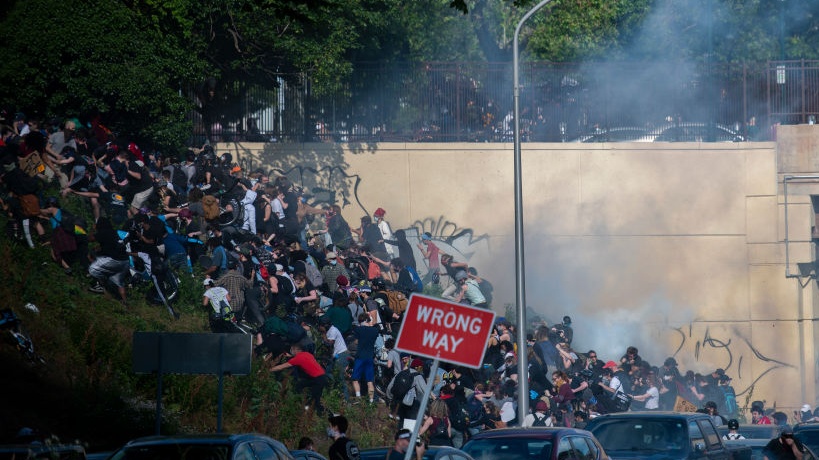The city of Philadelphia has been hit with multiple lawsuits for violence enacted by its police department during recent protests over the police killings of George Floyd and Breonna Taylor, CBS News reported.
According to HuffPost, the Abolitionist Law Center partnered with Philadelphia civil rights lawyers and the NAACP Legal Defense and Educational Fund to file three lawsuits on behalf of 146 protesters who say police were firing at peaceful protesters throughout demonstrations which aren't letting up.
“They were shooting children. They were shooting old people. They were shooting residents on their own street. They were gassing the firefighters. They were just opening fire on anybody they saw, for hours and hours, regardless of any conduct or justification,” Bret Grote, legal director of the law center, told the Associated Press.
This morning we join @NAACP_LDF
@KRMFLaw in filing a lawsuit on behalf of Black community members & protesters who were terrorized by @PhillyPolice in #WestPhilly May 31. Plaintiff Shahidah shares "my children and I no longer feel safe in our own house…" #endstateviolence
pic.twitter.com/o7l2zUTL5F— Abolitionist Law Center (@AbolitionistLC) July 14, 2020
According to the AP, one of the lawsuits includes accusations that the Philadelphia police force was using tanks, tear gas, rubber bullets and other weapons of war to indiscriminately harm protesters for weeks. Some police actions led to people being injured near their own homes.
The Philadelphia Inquirer published all three lawsuits on Tuesday.
The accusations include statements saying police targeted Black businesses and inflicted unnecessary violence on people who were not involved in the protests.
“City officials must be held accountable for these militaristic police actions, which are discriminatory, illegal, and completely unacceptable. Our clients deserve safety and security in their own neighborhood and to be free of fear of discrimination and police terror,” Cara McClellan, an attorney with the NAACP’s Legal Defense Fund, said in an interview with The Inquirer.
While the city has not officially commented on the lawsuits, Mayor Jim Kenney has already apologized for specific instances where he said the use of force may not have been justified.
“I am highly concerned about what transpired on both I-676 and 52nd Street and I fully regret the use of tear gas and some other use of force in those incidents,” Kenney said.
The incident Kenney is referencing was a June 1 situation that was caught on video. Police were shooting tear gas at protesters who were trapped on the side of a highway embankment. The video fueled even more protests.
One of the 146 plaintiffs, Shahidah Mubarak-Hadi, told lawyers that her young children are now terrified after the actions of police in west Philadelphia.
“Officers violated the sanctity of our home, without forethought, senselessly firing tear gas around our residence while we were inside. My children and I no longer feel safe in our own house,” she said.
Lawyers added that police were walking up and down blocks in a predominantly Black neighborhood firing tear gas canisters "indiscriminately" in what witnesses described as "a war zone."
Prominent activist and attorney Michael Coard told Philadelphia Magazine in June that there will be many lawsuits against the police, considering the sheer amount of video evidence showing officers engaging in violence.
“The First Amendment is sacrosanct. It is not to be praised one day as this glorious document and then used like a piece of toilet paper the next day even if the city and police think that peaceful protesting is a s**tty way to petition your government. What happened here is blatant, obvious and egregious. There should not only be civil liabilities but also more criminal prosecutions,” Coard said.
According to The Inquirer, lawyers spoke during a news conference about a grandmother who was shot in the face with a rubber bullet while walking down the street. Other protesters said they suffered from injuries requiring mental health treatment, rashes and breathing difficulties related to the tear gas.
